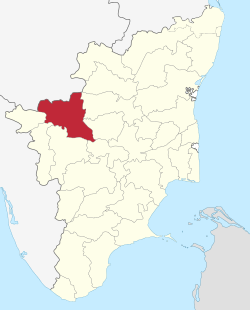Erode
| Erode | |
|---|---|
| City | |
|
River Kaveri at Erode. | |
|
Nickname(s): Turmeric City Textile City | |
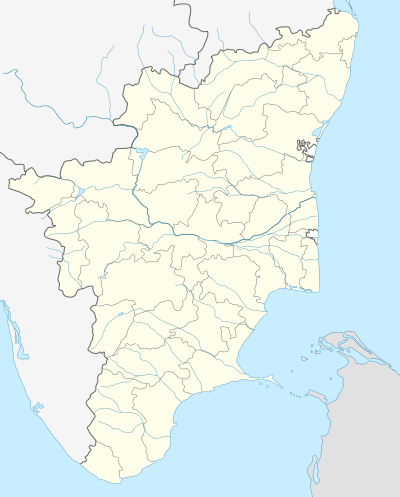 Erode Location in Tamil Nadu, India | |
| Coordinates: 11°21′N 77°44′E / 11.350°N 77.733°ECoordinates: 11°21′N 77°44′E / 11.350°N 77.733°E | |
| Country | India |
| State | Tamil Nadu |
| District | Erode District |
| Region | Kongu Nadu |
| Government | |
| • Type | Municipal Corporation |
| • Body | Erode Municipal Corporation |
| Area | |
| • Total | 109.52 km2 (42.29 sq mi) |
| Elevation | 183 m (600 ft) |
| Population (2011) | |
| • Total | 521,776 |
| Languages | |
| • Official | Tamil |
| Time zone | UTC+5:30 (IST) |
| PIN | 63800x |
| Telephone code | 91 (424) |
| Vehicle registration | TN-33, TN-86, TN-56 |
| Website |
erodecorporation |
Erode ([iːroːɽɯ]) is the seventh largest urban agglomeration of the South Indian state, Tamil Nadu and serves as administrative headquarters of Erode District. Administered by a municipal corporation since 2009, Erode is a part of the Erode Lok Sabha constituency that elects its member of parliament. Located on the banks of River Kaveri, it is situated centrally on South Indian Peninsula, about 400 kilometres (249 mi) southwest of its state capital Chennai and about 80 kilometres (50 mi) east of Coimbatore. Erode is an agricultural, textile[1] and a BPO hub[2] and among the largest producers of turmeric,[3][4]hand-loom and knitwear,[5]food products.
History
Etymology of Erode might have its origin in the Tamil phrase Eru Odai meaning two streams based on presence of two water courses of Perumpallam and Kalingarayan Canal. Alternatively, it might have been derived from Tamil phrase Eera Odu meaning 'wet skull' based on Indian mythology.[6][7] During Sangam age, Erode region formed a part of the historical Kongu Nadu region ruled by Cheras and then by Kalabhras who were ousted by Pandyas around 590 CE. Afterwards, it was ruled by Rashtrakutas and by Cholas from 10th to early 13th century, when Erode briefly came under the rule of Delhi Sultanate. Erode was annexed by Vijayanagar Empire in 1378 CE till gaining independence in 1559 CE by Madurai Nayaks, who were defeated by Hyder Ali in 1736 CE. Consequent to fall of Tipu Sultan of Mysore in 1799, Erode was controlled by British East India Company with Maharaja of Mysore as principal ruler. Erode remained under British rule until Indian independence in 1947.[8][9][10]
Geography
The city has a semi-arid climate with moderate to high temperatures throughout the year and relatively low rainfall. Temperature ranges from 80 °F (27 °C) to 96 °F (36 °C) with an average rainfall of 812 mm (32.0 in). Like rest of the state, March to June are the hottest and December to January are the coldest months of the year. While the Southwest monsoon (June to August) brings scanty rainfall, bulk of the rainfall is received during the Northeast monsoon in October, November and December. The municipality covers an area of 8.44 km2 (8,440,000 m2)[11]
Climate
Erode has a hilly terrain with undulating topography as Urugumalai, Athimalai, Chennimalai hills surround the city. Amaravathy, Noyyal, Bhavani, and Kaveri rivers flow into the city. While no notable mineral resources are available, loam, gravel and limestone are found in abundance in the river beds.
| Climate data for Erode | |||||||||||||
|---|---|---|---|---|---|---|---|---|---|---|---|---|---|
| Month | Jan | Feb | Mar | Apr | May | Jun | Jul | Aug | Sep | Oct | Nov | Dec | Year |
| Average high °C (°F) | 31.4 (88.5) |
34.1 (93.4) |
36.5 (97.7) |
37.1 (98.8) |
36.6 (97.9) |
34.5 (94.1) |
33 (91) |
33.2 (91.8) |
33.3 (91.9) |
32.2 (90) |
30.9 (87.6) |
30.4 (86.7) |
33.6 (92.5) |
| Average low °C (°F) | 20.1 (68.2) |
21.1 (70) |
23.2 (73.8) |
25.4 (77.7) |
25.7 (78.3) |
24.7 (76.5) |
24 (75) |
23.9 (75) |
23.7 (74.7) |
23.4 (74.1) |
22.1 (71.8) |
20.5 (68.9) |
23.2 (73.7) |
| Average precipitation mm (inches) | 9 (0.35) |
13 (0.51) |
12 (0.47) |
47 (1.85) |
82 (3.23) |
28 (1.1) |
50 (1.97) |
80 (3.15) |
77 (3.03) |
171 (6.73) |
88 (3.46) |
43 (1.69) |
700 (27.54) |
| Source: Climate-data.org[12] | |||||||||||||
Demographics
| Historical population | ||
|---|---|---|
| Year | Pop. | ±% |
| 1901 | 15,529 | — |
| 1911 | 16,701 | +7.5% |
| 1921 | 22,911 | +37.2% |
| 1931 | 33,672 | +47.0% |
| 1941 | 39,483 | +17.3% |
| 1951 | 57,576 | +45.8% |
| 1961 | 73,762 | +28.1% |
| 1971 | 105,111 | +42.5% |
| 1981 | 142,252 | +35.3% |
| 1991 | 159,232 | +11.9% |
| 2001 | 173,600 | +9.0% |
| 2011 | 498,129 | +186.9% |
| Sources: | ||
As of 2011, Erode has 521,776[16] in population with a sex-ratio of 996, above national average of 929. Literacy rate of 85% compares favorably to the national average of 73%.[16] The city had 43,184 households with Scheduled Castes and Scheduled Tribes accounting for 11% and 0.15% of the population respectively. Of its 66,135 workers, 61,382 are classified as other workers and rest in agriculture and household industries.[17] As of 2001, 52 slums were identified with 33,000 people residing in slums.[18] Per religious census of 2011, Erode had 83% Hindus, 12% Muslims and 4% Christians.[15] The population had increased 11 times during 20th century.[13] While Tamil is the main spoken language, English is common as the medium of instruction in educational institutions and in service sector.[19]
Economy
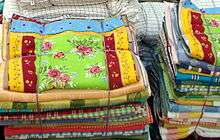
Erode district's gross domestic product (GDP) grew at 15.5% in 2008 ahead of the state's GDP growth by 4%.[20] According to Indian Census of 2001, urban workforce participation rate for Erode is 35% with growth in secondary and tertiary sectors and a corresponding decrease in the primary sector. Major employment is provided by textile industry, turmeric industry and oil and rice mills with 69% of its workforce employed in tertiary sector.
As of 2001, district had two industrial estates with 60 tanneries, 165 lock manufacturing and several cotton spinning mills.[21][22] While hand loom weaving and carpet manufacturing flourished in early days, emergence of power loom led to 24,189 small scale and 59 large scale units by 2000.
Erode is known as "Turmeric City" or "Yellow City" on account of production of turmeric in the state. It has one of the largest markets for coconut.[21] and coconut oil production in south India.[23] Erode stands second in leather processing in the state, next to Ambur. Paper companies like Seshasayee paper boards are located on banks of river Kaveri. Sugarcane processing extracts juice to make sugar with its remains used for paper manufacturing. Additionally, dal mills, cotton , vanaspathi manufacturing, wax and screen printing and printing press are located in the city.
Tourism
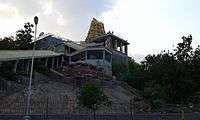
Thindal Murugan Temple, situated 6 km (3.7 mi) from the city is the most prominent temple in the city. Periya Mariamman Temple, Natadreeswarar Temple, the hillock temple of the Kaveri river, Sangameswarar Temple, CSI Brough Church, Thowheeth mosque, Ravlathul Janna mosque, Bazaar Mosque and Jamia Pallivasal are prominent religious destinations in the city. While the city is built around a demolished fort, a temple for Arudra Kabaleeswar (Shiva) praising the Saiva and one for Kasthuri Ranganatha Perumal (Vishnu) praising the Vaishnava aspects of Hinduism exists. E.V.R Corporation Museum and Thanthai Periyar Memorial House, which depicts the life of Periyar E. V. Ramasamy, are prominent museums in the city. Sankagiri Fort and Vellode Birds Sanctuary are other visitor attractions around the city.[24][25]
Law and Government
| Municipality officials[26] | |
|---|---|
| Commissioner | M. Seeni Ajmalkhan |
| Deputy Mayor | P. V. Arumugam |
| Elected members | |
| Member of Parliament | S. Selvakumara Chinnayan[27] |
| Member of Legislative Assembly | K. V. Ramalingam (Erode West)[28] |
| Member of Legislative Assembly | K.S.Thennarasu (Erode East)[29] |
Law and order is maintained by Erode sub division of Tamil Nadu Police headed by a Deputy Superintendent. There are seven law & order police stations located at Karungalpalayam, Bazaar, Surampatti, Veerappanchatram, Rangampalayam, Chithode and Periyar GH Police Station. There are special units like armed reserve, prohibition enforcement, district crime, social justice and human rights, district crime records and a special branch.[30]
Erode is the headquarters of Erode District which was bifurcated from Coimbatore District in 1979. The town was constituted as a municipality in 1871, promoted to special-grade during 1980 and upgraded as a corporation in 2008. City's corporation area covers part of Bhavani, Modakurichi, Perundurai and Komarapalayam constituencies. Its functions are devolved into six departments: general administration/personnel, Engineering, Revenue, Public Health, city planning and Information Technology (IT) under the control of a Municipal Commissioner who is the executive head.[31] Erode has 60 wards with an elected councillor.[32] The legislative powers are vested in a body of 60 members, one each from the 60 wards.[33] The legislative body is headed by an elected Chairperson assisted by a Deputy Chairperson.[34]
The current Member of Parliament is Selvakumara Chinnayan from the AIADMK party.[35] While Erode has two state assembly constituencies namely Erode East and Erode West to elect members to Tamil Nadu Legislative Assembly once every five years, until 2004 elections, Erode had only one constituency.[36] The current MLA of Erode (East) is K.S.Thennarasu from AIADMK and Erode (West) is K.V. Ramalingam from AIADMK.[37][38][39]
Public services
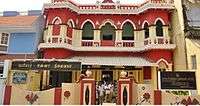
As of 2006, there were 46 public and private schools with four technical institutes; Government Technical Institute being most prominent. There are four school playgrounds in the city.[40] Electricity supply is regulated and distributed by Tamil Nadu Electricity Board (TNEB) as the city along with its suburbs forms Erode Electricity Distribution Circle. A Chief Distribution engineer is stationed at the regional headquarters.[41] Water supply is provided by Erode Municipality from river Kaveri through its eight reservoirs. For 2000–01, 14 million litres of water was supplied everyday for households in the city.[42] About 110-125 metric tonnes of solid waste were processed by the sanitary department in 2011.[43] As there is no underground drainage system, disposal of sullage is through septic tanks, open drains and public conveniences[44] with its 192 km (119 mi) of storm water drains.[45] Thandhai Periyar Government General Hospital serves as primary centre of healthcare. Several private hospitals such as Lotus Hospitals, Kumarasamy hospital, Idhayam Apollo Specialty Hospital, C.K Hospital, Maruthi Medical Center Hospital (MMCH), Kovai Medical Center Hospital (KMCH), Erode Trust Hospital, National Hospital (formerly Savitha Hospital) serve in the area.[46] As of 2011, municipality maintained 4,678 street lamps.[47] The corporation operates two markets, namely the Nethaji market and Silambarasan kuttai market and a textile market named EKM Abdul Gani Market in Brough road.[48]
Transport
Road
Erode maintains 102 km (63 mi) of local roads with 5 km (3.1 mi) of concrete and rest bituminous. Additionally, 16.6 km (10.3 mi) of state highways is maintained by State Highways Department.[49] Also, NH 47 connecting Salem – Coimbatore – Kanyakumari, bypasses the city via Bhavani, Chithode and Perundurai.[50] The Tamil Nadu State Transport Corporation has a sub-divisional headquarters at Erode under the Coimbatore division. Erode Central Bus Terminus, is the main bus station complex for State Express Transport Corporation and private carriers operate long distance buses connecting to major cities like Chennai, Bangalore etc.[51][52] The main arterial roads include:
- SH-15 connecting Erode – Gobichettipalayam – Sathy – Mettupalayam – Kotagiri – Ooty
- SH-37 connecting Erode – Arachalur – Kangeyam - Dharapuram – Palani
- SH-79 connecting Erode – Tiruchengode – Rasipuram – Attur
- SH-79A connecting Erode – Pallipalayam – Sankagiri
- SH-84 connecting Erode – Kodumudi – Karur
- SH-84A connecting Erode – Modakurichi – Kandasamypalayam – Vellakoil – Mulanur
- SH-96 connecting Erode – Perundurai – Chennimalai
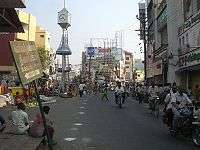
Rail
Erode Junction railway station is a major rail junction in Salem division of Southern Railway with a diesel locomotive shed and an electric locomotive shed attached. It also serves as a hub for water filling facilities, food provisions and cleaning services for long-distance trains that run via Erode.[53] The following are the lines running from Erode junction:
| Line No. | Towards | Passing Through Station | Type / Track |
|---|---|---|---|
| 1 | Salem Junction | Sankagiri | Broad, Electrified – Double Track[54] |
| 2 | Coimbatore Junction | Tiruppur | Broad, Electrified – Double Track[55] |
| 3 | Trichy Junction | Karur | Broad, Single Track[56] |
Air
The nearest airport to Erode is Coimbatore International Airport at a distance of 90 km with regular flights to domestic destinations including Ahmedabad, Bangalore, Bhubaneswar, Chennai, Delhi, Hyderabad, Kolkata, Kozhikode, Mumbai, Pune and international destinations including Sharjah and Singapore.[57]
References
- ↑ "Possibilities for improving vehicular traffic flow explored". The Hindu. 8 September 2015.
- ↑ Conversion of City Corporate Plan to Business Plan for Erode municipality (PDF) (Report). Commissioner of Municipal Administration, Government of Tamil Nadu. 2007. Retrieved 2012-11-16.
- ↑ Prasad S., Aggarwal, B., Turmeric, the Golden Spice; in: Herbal Medicine: Biomolecular and Clinical Aspects; editors: Benzie IFF, Wachtel-Galor S.; CRC Press/Taylor & Francis; Boca Raton, 2011.
- ↑ "Turmeric at an all-time high price". Economic Times. 29 December 2009.
- ↑ "Lok Sabha Elections 2014: Erode has potential to become a textile heaven says Narendra Modi". DNA India. 17 April 2014.
- ↑ Room, Adrian (2003). Placenames of the World: Origins and Meanings of the Names for Over 5000 Natural Features, Countries, Capitals, Territories, Cities and Historic Sights. McFarland. p. 119. ISBN 9780786418145.
- ↑ Abdi, Wazir Hasan (1992). Toils and triumphs of Srinivasa Ramanujan, the man and the mathematician. National. p. 3.
- ↑ Urban Infrastructure Report 2006, p. 30
- ↑ "Historical moments". Erode municipality. 2011. Archived from the original on 24 December 2009. Retrieved 29 December 2012.
- ↑ "Historical moments of Erode district". Erode District Administration. 2011. Retrieved 29 December 2012.
- ↑ "About Erode". Erode municipality. 2011. Archived from the original on 26 July 2012. Retrieved 29 December 2012.
- ↑ "climate data of Erode". climate-data.org. Retrieved 2013-07-01.
- 1 2 Urban Infrastructure Report 2006, pp. 31-34
- ↑ "Smart City Challenge-Erode". Government of India. Retrieved 15 December 2015.
- 1 2 "Population By Religious Community - Tamil Nadu" (XLS). Office of The Registrar General and Census Commissioner, Ministry of Home Affairs, Government of India. 2011. Retrieved 13 September 2015.
- 1 2 "Census Info 2011 Final population totals". Office of The Registrar General and Census Commissioner, Ministry of Home Affairs, Government of India. 2013. Retrieved 26 Jan 2014.
- ↑ "Census Info 2011 Final population totals - Erode". Office of The Registrar General and Census Commissioner, Ministry of Home Affairs, Government of India. 2013. Retrieved 26 Jan 2014.
- ↑ Urban Infrastructure Report 2008, p. 43
- ↑ Urban Infrastructure Report 2008, p. 4
- ↑ "Erode GDP is better than that of State". The Hindu. Chennai, India. 15 December 2007. Retrieved 2013-07-01.
- 1 2 Urban Infrastructure Report 2006, p. 32
- ↑ "About Erode". Erode municipality. 2011. Archived from the original on 12 November 2013. Retrieved 29 December 2012.
- ↑ "Industries Erode". Erode municipality. 2011. Archived from the original on 21 September 2012. Retrieved 29 December 2012.
- ↑ "Visitor attracts at Erode". Erode municipality. 2011. Archived from the original on 21 September 2012. Retrieved 29 December 2012.
- ↑ "Erode museum to host exhibition on A.W. Brough". The Hindu. 19 November 2009. Retrieved 29 December 2012.
- ↑ "Welcome to Erode City Municipal Corporation | E-Governance and Citizen services". erodecorporation.gov.in. Retrieved 2017-11-25.
- ↑ "Members of Lok Sabha from Tamil Nadu". Government of Tamil Nadu. 2014. Retrieved 26 May 2014.
- ↑ "MLA of Erode West". Government of Tamil Nadu. 2011. Archived from the original on 28 January 2013. Retrieved 29 December 2012.
- ↑ "MLA of Erode East". Government of Tamil Nadu. 2011. Archived from the original on 28 January 2013. Retrieved 29 December 2012.
- ↑ "Erode Police". Erode municipality. 2011. Archived from the original on 21 September 2012. Retrieved 29 December 2012.
- ↑ "Commissionerate of Municipal Administration". Commissionerate of Municipal Administration. 2006. Archived from the original on 6 November 2012. Retrieved 29 December 2012.
- ↑ "About the municipality". Erode municipality. 2011. Archived from the original on 26 September 2012. Retrieved 29 December 2012.
- ↑ "Councillors of municipality". Erode municipality. 2011. Archived from the original on 14 June 2012. Retrieved 29 December 2012.
- ↑ "Economic and political weekly, Volume 30". Sameeksha Trust. 1995: 2396.
- ↑ "Members of Lok Sabha from Tamil Nadu". Government of Tamil Nadu. 2014. Retrieved 26 May 2014.
- ↑ "List of Assembly Constituencies". Tamil Nadu. Tamil Nadu state government. 2010. Archived from the original on 14 June 2012. Retrieved 29 December 2012.
- ↑ "MLA of Erode West". Government of Tamil Nadu. 2011. Archived from the original on 28 January 2013. Retrieved 29 December 2012.
- ↑ "MLA of Erode East". Government of Tamil Nadu. 2011. Archived from the original on 28 January 2013. Retrieved 29 December 2012.
- ↑ "Partywise Comparison Since 1977". Election Commission of India. 2011. Retrieved 29 December 2012.
- ↑ "Educational Institutions". Erode municipality. 2011. Archived from the original on 21 September 2012. Retrieved 29 December 2012.
- ↑ "Important Address" (PDF). Indian Wind Power Association. 2011. Archived from the original (PDF) on 16 October 2012. Retrieved 29 December 2012.
- ↑ "Water Supply Details". Erode Municipality. 2011. Archived from the original on 26 September 2012. Retrieved 29 December 2012.
- ↑ "Waste management programme". Erode Municipality. 2011. Archived from the original on 1 July 2013. Retrieved 29 December 2012.
- ↑ "Erode sewarage". Erode municipality. 2011. Archived from the original on 1 July 2013. Retrieved 29 December 2012.
- ↑ "Storm water drains of Erode". Erode municipality. 2011. Archived from the original on 1 July 2013. Retrieved 29 December 2012.
- ↑ "Erode hospitals". Erode municipality, Government of Tamil Nadu. 2011. Archived from the original on 2 August 2012. Retrieved 29 December 2012.
- ↑ "Erode street lights". Erode Municipality, Government of Tamil Nadu. 2011. Archived from the original on 8 September 2012. Retrieved 29 December 2012.
- ↑ "Erode markets". Erode Municipality, Government of Tamil Nadu. 2011. Archived from the original on 13 November 2013. Retrieved 29 December 2012.
- ↑ "Erode roads". Erode municipality. 2011. Archived from the original on 26 September 2012. Retrieved 29 December 2012.
- ↑ Urban Infrastructure Report 2006, pp. 44-45
- ↑ "S.E.T.C. Tamil Nadu Ltd., Computer reservation centres". Tamil Nadu State Transport Corporation Ltd. 2011. Retrieved 29 December 2012.
- ↑ Transport Handbook (PDF) (Report). Tamil Nadu State Transport Corporation Ltd. 2011. Retrieved 29 December 2012.
- ↑ "Use of water in trains for bathing leads to shortage". The Hindu. 12 December 2012. Retrieved 2013-07-01.
- ↑ "Re-schedule train timings". The Hindu. 29 January 2008. Retrieved 2013-07-01.
- ↑ "Palakkad-Erode train commences service". The Hindu. 13 May 2013. Retrieved 2013-07-01.
- ↑ "Trains partially cancelled". The Hindu. 2 February 2013. Retrieved 2013-07-01.
- ↑ "Trains partially cancelled". The Hindu. 15 November 2012. Retrieved 2013-07-01.
